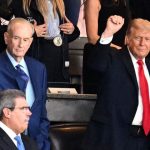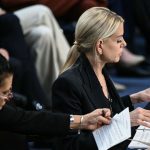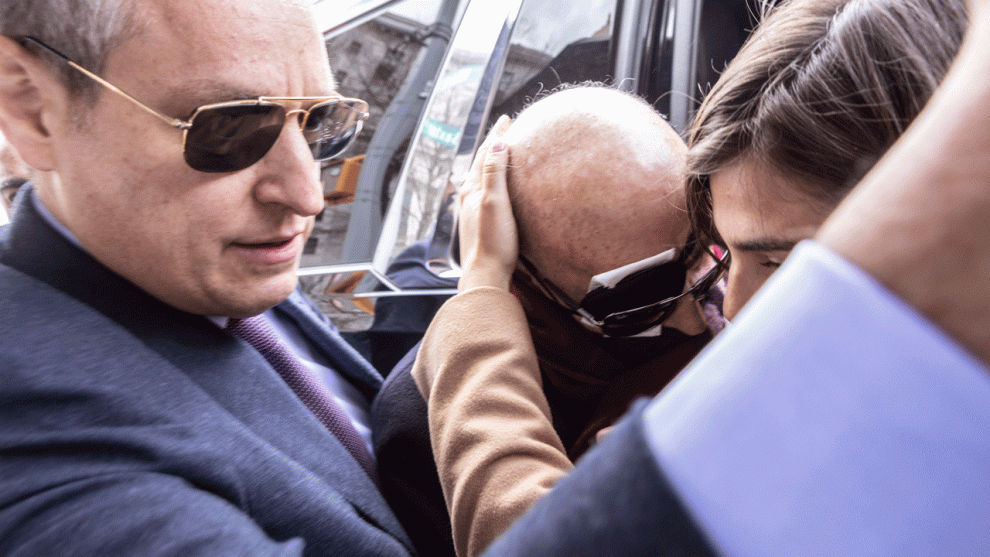NEW YORK (AP) — British billionaire Joe Lewis, whose family trust owns the Tottenham Hotspur soccer club, will not spend any time in prison after pleading guilty to insider trading and conspiracy charges in New York, a federal judge said Thursday.
Judge G.L. Clarke cited Lewis’ decision to promptly come to the United States to face charges and his failing health, along with a lifetime of good works, in ruling that Lewis will face three years on probation and a $5 million fine rather than time behind bars.
BRITISH BILLIONAIRE JOE LEWIS PLEADS NOT GUILTY TO INSIDER TRADING IN NYC COURT APPEARANCE
Lewis, 87, was wearing an eye patch and one of his hands shook steadily throughout the one-hour proceeding in a federal court in Manhattan. He has remained in the United States since last July.
Before he was sentenced, Lewis spoke briefly, saying he learned growing up in England during World War II how “precious” life is and decided to devote much of his life to finding a cure for “horrendous diseases.”
“Your honor, I’m here today because I made a terrible mistake. I’m ashamed,” he said.
Lewis said he hoped “to make amends and to rebuild the trust that I have squandered” for the remainder of his life.
U.S. sentencing guidelines had called for Lewis, a citizen of the United Kingdom and resident of the Bahamas, to serve 18 months to two years behind bars. Even prosecutors, though, agreed time behind bars was not necessary.
At his January plea, Lewis admitted that he agreed in 2019 to share secrets about publicly traded companies with several individuals. Prosecutors said afterward that his company, Broad Bay Limited, and Lewis would pay $50 million in financial penalties, the largest such penalty for insider trading in a decade.
His lawyer said Thursday that the money was in escrow and ready to be paid and plans were for him to leave the United States for the Bahamas on Thursday night.
Prosecutors wrote in their presentence submission that Lewis deserved leniency because he is older and “battles significant health issues” that would cause a term of imprisonment to be more difficult for him than others.
They cited his acceptance of responsibility that he demonstrated by voluntarily surrendering rather than forcing a drawn-out extradition battle, and said that he’d “otherwise lived a law-abiding life.”
The government also noted that Lewis is recognized as one of the 500 richest people in the world with approximately $6.2 billion as of February, including homes in several countries; a $250 million yacht; private planes valued at $90 million and an art collection worth $100 million.
When she announced the sentence, the judge said: “It is clear to me that Mr. Lewis’s life would be at serious risk if he were to be incarcerated.”
Defense attorneys said in their presentence submission that Lewis “is nearing the end of life in declining health.”
They said Lewis was aware that his conviction meant he can’t return to the United States to see his children, grandchildren or great-grandchildren, who all live in the U.S.
From the start, Lewis was no ordinary defendant. After his arrest less than a year ago, he had been free on $300 million bail after putting up a yacht and private plane as collateral.
In court papers, prosecutors said Lewis learned secrets about public companies after making large investments. They said that on at least four occasions, he tipped off his girlfriend, personal pilots, employees and friends, enabling them to profit from the secrets.
“This insider trading was not the result of aberrant, one-time conduct, but rather, a troubling pattern of misconduct over the course of several years,” they wrote.
Prosecutors said the insider activity might have resulted from “hubris, ego, a desire to make a financial gift without parting with his own money, an irrational form of greed, or some other reason.”
But, regardless, “it is clear that Lewis believed he was above the law — that he had achieved a level of wealth and stature that relieved him from having to operate by the same rules that apply to everyday investors,” prosecutors said.
As he left the courthouse, Lewis was surrounded by aides who blocked members of the media from seeing him as he walked a short distance to a waiting vehicle.
























